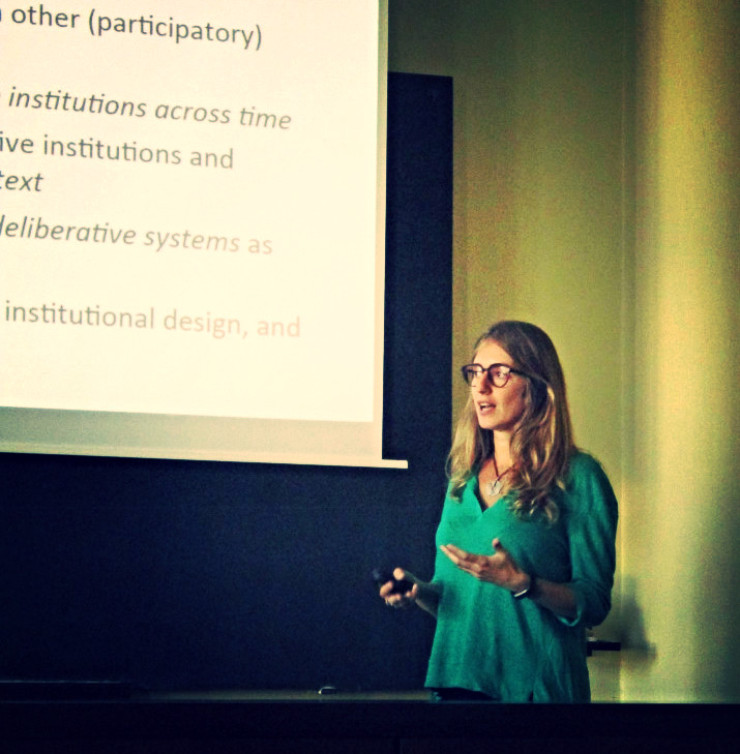Notícias
-
September News
What's new @LATINNO? Summer 2016 came to an end and the LATINNO project is starting the fall season with some exciting new endeavors. Although we had to say goodbye to some of our excellent trainees after they finished their internship with us, we are welcoming new and very motivated collaborators to the team. Our data collection is constantly growing, and we are now advancing into 3 of the last 5 remaining countries: Guatemala, Nicaragua and Panama. We're also revising and updating the data on the first 15 countries we've coded to fill in some missing values - it's not easy to find the information we need to code all 42 variables for each case! Meanwhile, the case descriptions are being prepared to go online in the coming months. This means translating each of our current 1901 cases to all three languages of our website: English, Spanish and Portuguese. It's a lot of work, but we love doing it and look forward to sharing it with you!
> Ler mais -

New results from the LATINNO database presented at the APSA and ECPR annual conferences
In September, freshly released data and results from LATINNO's database were presented at the annual meeting of the American Political Science Association (APSA), in Philadelphia, and at the annual conference of the European Consortium for Political Research (ECPR), in Prague. At the 2016 ECPR General Conference, held from 7 - 10 September, LATINNO Coordinator Thamy Pogrebinschi chaired the panel "Democratic Innovations in Latin America: Beyond the Participatory Budgeting", in which she presented new information and data added to the LATINNO database. Her paper "Comparing Deliberative Systems: An Assessment of 12 Countries in Latin America" proposes a comparative approach to deliberative democracy and a theoretical framework to assess how deliberative systems operate at the country and cross-country levels. The paper can be downloaded from the APSA and ECPR websites.
> Ler mais -
Database Progress in August
After a long process of data collection, our database contains 1696 democratic innovations from 16 countries. Our quantitative and qualitative analysis includes the coding of 42 variables regarding the context, the institutional design, and the impact of each democratic innovation.
> Ler mais -
See what happened in July in LATINNO
LATINNO is more than a research project. One of our major goals is bringing together the academia and the policy practice to learn from each other. We seek to promote the exchange of information and knowledge on democratic innovations, and spur the debate on how new forms of citizen participation might improve democracy in Latin America and elsewhere. To this end, LATINNO contributes to both fields by participating in international conferences and events, publishing policy briefs and academic papers, and making data available. Here’s a summary of what happened at LATINNO in July.
> Ler mais -
Featured Case from Uruguay: "Por Mi Barrio"
“For my neighborhood” (Por Mi Barrio) is an online geolocation platform that allows the citizens of Montevideo to pin on a map any tangible and concrete problem related to urban public services, such as broken streetlights, potholes, and littering. The user can make the claims via smartphone or a computer by simply identifying the problem in a location according to predefined categories and with the option of adding a commentary and/or a picture.
> Ler mais -
“Alerta Democrática” en Latinoamérica: ¿democracia en transformación, en tensión, en movilización o en agonía?
¿Cuál es el futuro de la democracia en Latinoamérica? ¿Está en transformación, en tensión, en movilización o en agonía? Alerta Democrática, un proyecto de Avina, Open Society Foundations y Ford Foundation, presenta cuatro escenarios posibles según un enfoque holístico para la reflexión y la acción.
> Ler mais -
LATINNO a debate en el Congreso Mundial de Ciencias Políticas
La profesora Thamy Pogrebinschi presenta hoy algunos resultados iniciales basadado en la base de datos LATINNO en el vigésimo cuarto Congreso Mundial de Ciencias Políticas, celebrado en Poznan (Polonia). La investigación ofrece algunas primeras observaciones sobre cómo ciertas características del diseño institucional de innovaciones democráticas están destinadas a impactar en diferentes dimensiones de la calidad de la democracia.
> Ler mais -
LATINNO va a clase: Innovaciones Democráticas en América Latina a debate en la Universidad Humboldt
La coordinadora de LATINNO, Thamy Pogrebinschi, ofreció durante el pasado semestre un seminario en el Instituto de Ciencias Sociales de la Universidad Humboldt de Berlín bajo el título “Democracia y Participación en Latinoamérica”. Estudiantes, procedentes de diversas disciplinas tales como Ciencia Política, Sociología, Cultura y Estudios Latinoamericanos, debatieron durante doce semanas el contexto histórico y político tras la transición de la transición de las democracias latinoamericanas, con especial atención a la situación actual y sus particularidades.
> Ler mais -
Innovaciones democráticas en América Latina. Una historia, un proyecto, muchas ideas nuevas
En la entrevista “Innovaciones democráticas en América Latina. Una historia, un proyecto, muchas ideas nuevas”, Mariano Valentini conversa con Thamy Pogrebinschi sobre el origen, desarrollo y primeros resultados de LATINNO. De igual forma, se discuten temas relevantes como el papel de las herramientas digitales en los procesos democráticos latinoamericanos y el futuro de los partidos políticos frente al avance de las innovaciones democráticas. http://www.adaciudad.org.ar/sin-categoria/tercer-numero-de-nuestra-revista-igualdad-autonomia-personal-y-derechos-sociales/
> Ler mais -
LATINNO se une a la fiesta de verano de Liquid Democracy en Berlín
¿Has escuchado hablar sobre el concepto "Democracia Líquida"? ¿Qué pasaría si por medios digitales participamos en las decisiones políticas? El "think&do-tank" Liquid Democracy de Berlín es un pionero en Europa en el desarrollo de una nueva plataforma de toma de decisiones participativa, la Adhocracy, un software de código abierto que provee a ciudadanos con herramientas cívicas de participación.https://liqd.net/en/
> Ler mais
